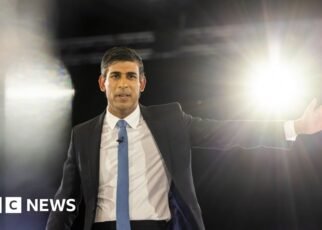He was arguing for Britain’s departure from the EU from his earliest days in politics and supported the Leave campaign in the 2016 Brexit referendum.
But he first came to wider public attention during the coronavirus pandemic, when as the recently-appointed chancellor he spent eye-watering sums on the furlough scheme and other support measures, as well as launching the controversial Eat Out to Help Out scheme.
His personal popularity soared but he also got caught up in the Partygate controversies that rocked Downing Street, being fined, in June 2020, for attending one of the now infamous gatherings.
And he found himself increasingly at odds with his boss Boris Johnson over the economy – pushing for lower taxes and spending cuts.
In July 2022, he resigned from the cabinet, a move that was instrumental in ousting Mr Johnson, which some of the former PM’s allies have not forgotten.
He was not elected leader by Conservative Party members. He was, in effect, crowned by Tory grandees desperate for some stability after the chaos presided over by Liz Truss and latterly by Boris Johnson.
He inherited a financial crisis and a party in disarray but also a near 70-seat majority – which has since been significantly eroded by a series of by-election defeats featuring big swings against his party.
At the start of 2023, Mr Sunak set out five promises to voters, he wanted to be judged by:



